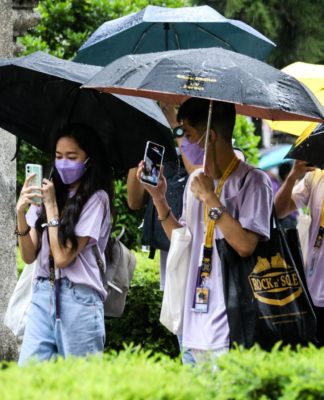 CHARLES Horton Cooley, an American sociologist, likened the concept of how we perceive ourselves through the eyes of other people to a “looking glass self,” where we, especially teenagers, conform to what others think of us as we build our self-impression. Social media has revolutionized Cooley’s theory into a much easier, however negative, way of looking at our self-worth—the “liking”-glass-self theory.
CHARLES Horton Cooley, an American sociologist, likened the concept of how we perceive ourselves through the eyes of other people to a “looking glass self,” where we, especially teenagers, conform to what others think of us as we build our self-impression. Social media has revolutionized Cooley’s theory into a much easier, however negative, way of looking at our self-worth—the “liking”-glass-self theory.
Filipinos enjoy building a network over the virtual highway as evidenced in the statistics gathered by the website Addictive Lists in April 2014, which ranked the Philippines as the eighth country in the world with the most number of Facebook users—29 million accounts.
Instagram, a more recent platform, has earned great prominence since it was launched. This photo-sharing medium “is the fastest-growing social site globally earning a spot in the top five most popular sites since its initial release in 2010,” said Tech Crunch, a technology news website. According to another tech news site, Digital Trends, Instagram had a 23-percent increase in active users in 2013 while Facebook’s active users grew by only three percent in the same year.
What’s common about these social networking sites, anyway? What made them gain such huge popularity?
Facebook and Instagram offer a two-sided effect on each user. One side creates a healthy online sphere, which people use as a social channel to share with others their experiences and captured moments with friends and family. The other side of the coin, however, is that it sometimes stirs up an unhealthy social frenzy that leads to teenage anxiety, said a mental health expert in an article on FoxNews.com. This means that people tend to “overvalue” these social media platforms, where they base their self-worth on how many likes or hits they get for each of their posts and on how many followers they have.
This is where Cooley’s theory of a looking-glass self comes into play, except that in our times, framing our self-image and building our self-esteem are squeezed into a small “like” button.
A mental health study conducted abroad showed that if people didn’t get an “adequate amount” of likes for their post, they would post another message, and if it still did not garner enough “likes,” they would lose self-confidence and start to look at themselves negatively. To get positive reaffirmation, they would put several hashtags, use like-boosting apps and even buy “followers.” It is not surprising that Filipinos, who are among the leading social-networking aficionados, encounter the same unfortunate circumstances.
“I realized that putting hashtags won’t just let your post be easily seen when searched by people, it also increases likes. So what I do, I add hashtags to my posts and when I reach my desired number of likes I delete them,” my blockmate from the College of Science confessed.
One of my friends from the College of Tourism and Hospitality Management admitted that she is using one app that boosts likes on Instagram. According to her, it is her way of making herself feel good.
“Whenever I get a few likes [on Instagram], I always think of myself as a lesser being,” she said. “I wonder why some people get more likes than I do. It actually makes me feel less loved. It makes me think I’m ugly. When I boost my Instagram likes, this feeling of being unwanted immediately wears off. Feeling ko ang ganda-ganda ko.”
The liking brigade may seem to be addictive because people have that natural tendency to take pleasure in the feeling of being liked. After all, being loved and having that sense of belongingness are requisites to have a good self-esteem as seen in Abraham Maslow’s Hierarchy of Needs.
Nonetheless, people must realize that the sense of belonging that online platforms give them is rather artificial. They create an illusion that makes them view every like they get as something that would satisfy their need, when in reality the “liking-glass-self theory” has just made them even thirstier for validation.
Sometimes, when a need starts to become a want, people start craving more than what they deserve. This merely lowers their defenses, making them succumb to their own insecurities and anxieties. Always put in mind that you may not get everything you want in this world, but when you seek real feelings from your true friends and your family, you might just get what you need.
The number of likes you get is not the end-all, be-all of your existence. Never let yourself be defined by a simple “click.”














